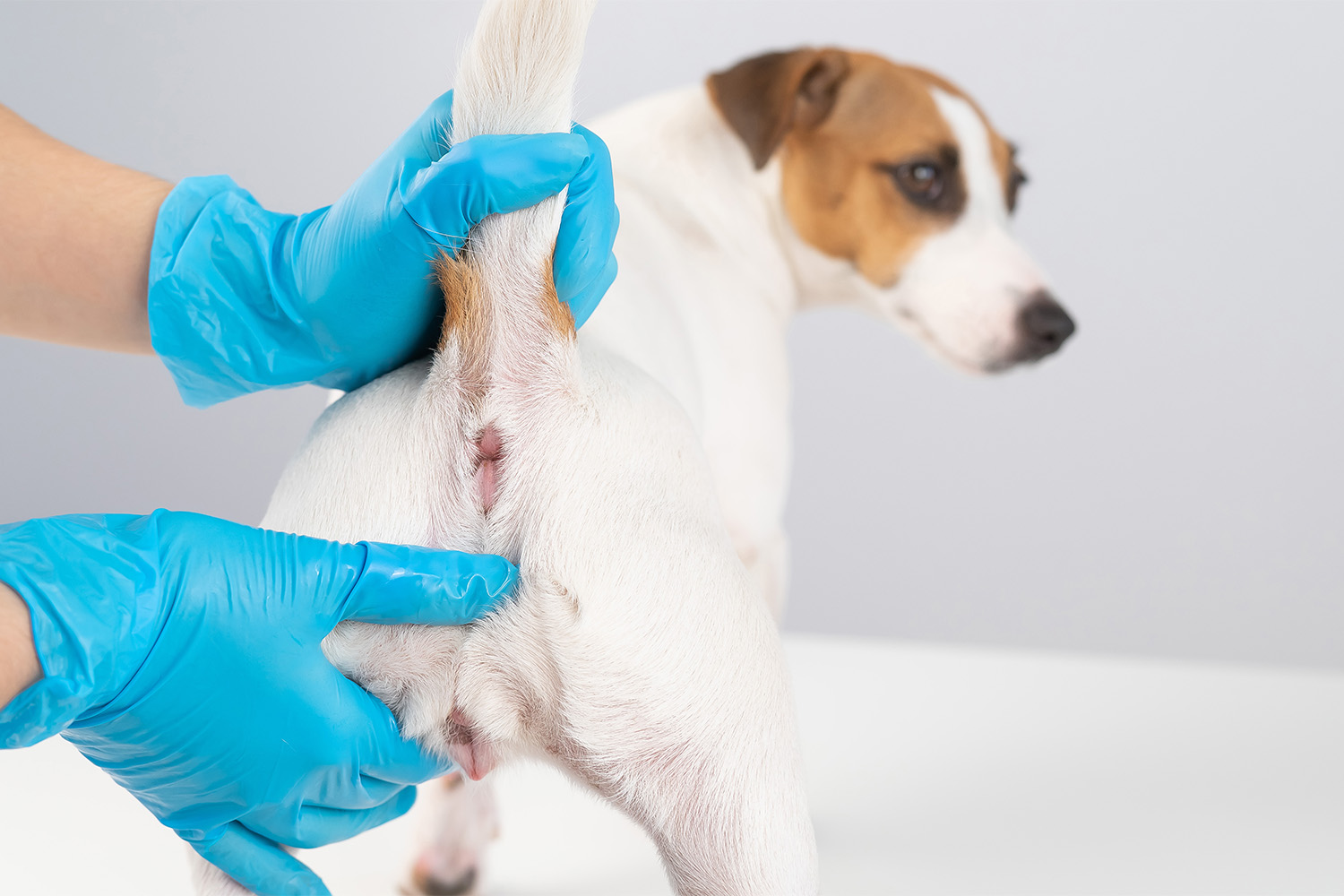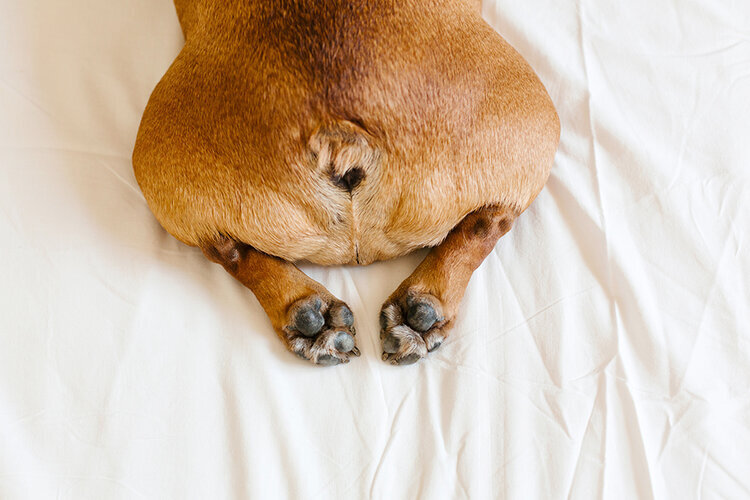You can get your dog’s anal glands expressed at a veterinary clinic or a professional grooming salon.

Credit: askvet.app
Why Is Anal Gland Expression Important For Dogs?
Anal gland expression is an essential aspect of maintaining your dog’s overall health and well-being. These small, scent-producing glands located near your dog’s anus serve an important purpose in their digestive system. When functioning properly, the anal glands release a small amount of fluid with each bowel movement. This fluid helps to mark territory and identify dogs to one another.
When and Why Do Dogs Need Their Anal Glands Expressed?
Dogs need their anal glands expressed when they are unable to do so naturally. This can happen due to various reasons, such as a lack of muscle tone in the anal sphincter or blockage of the gland ducts. If your dog is experiencing discomfort, scooting their bottom along the ground, or showing signs of anal gland issues such as odor or swelling, it may be necessary to manually express their anal glands.
What Happens if You Don’t Express Your Dog’s Glands?
If you neglect to express your dog’s anal glands, it can lead to a range of health problems. The fluid buildup in the glands can become impacted, causing discomfort and potential infection. In severe cases, the glands may even rupture, leading to a painful and messy situation. It’s important to address anal gland issues promptly to prevent these complications and ensure your dog’s comfort.
To help your dog naturally express their anal glands, you can take certain steps. Fiber supplements and a diet rich in fiber can promote healthy bowel movements and prevent gland blockage. Additionally, ensuring your dog has access to fresh water, regular exercise, and managing any diarrhea symptoms can all contribute to the natural expression of their anal glands.

Credit: ccanimalclinic.com
Where Can I Get My Dog’s Anal Glands Expressed?
If you’re wondering about where to get your dog’s anal glands expressed, you have a few options to consider. Anal gland expression is necessary for dogs if the glands become impacted or infected, causing discomfort or other issues. Here are the three main options:
Performing Anal Gland Expression At Home
If you’re comfortable and confident in handling your dog’s anal glands, you can choose to perform the expression at home. However, it’s crucial to learn the correct technique and ensure you have the right supplies, including gloves and lubricant. It’s important to note that expressing your dog’s anal glands at home may not be suitable for all pet owners, especially if your dog is fearful or aggressive.
Visiting A Veterinarian For Anal Gland Expression
Another option is to schedule an appointment with your veterinarian. Veterinarians are trained professionals who can safely and effectively express your dog’s anal glands. They have the necessary experience and equipment to perform the procedure, ensuring your dog’s well-being. Visiting a veterinarian also allows them to check for any underlying medical issues that may be causing the gland problems.
Options For Anal Gland Expression At Grooming Salons
Lastly, groomers who offer anal gland expression services can also help with this task. Groomers are experienced in handling dogs and can express the glands during a grooming session. However, it’s crucial to choose a reputable and trained groomer who follows proper hygiene and safety protocols. Consult with your vet or ask for recommendations from trusted sources to find a reliable grooming salon for anal gland expression.
Remember that the method and location you choose for your dog’s anal gland expression should prioritize their safety and well-being. It’s always a good idea to consult your veterinarian for guidance and to discuss any concerns or questions you may have.
How Can I Help My Dog Express Anal Glands Naturally?
Looking for a natural way to help your dog express their anal glands? Try fiber supplements, fresh foods, adequate water intake, regular exercise, and managing diarrhea symptoms. Remember that if your dog can’t express their glands themselves, it may be a sign of discomfort and should be addressed by a veterinarian.
Using Fiber Supplements And Fiber-rich Ingredients
One of the ways you can help your dog express their anal glands naturally is by incorporating fiber supplements and fiber-rich ingredients into their diet. Fiber supplements, such as psyllium husk, can help regulate your dog’s bowel movements and promote healthy digestion. These supplements work by absorbing water in the intestines, resulting in softer stools that are easier to pass. Additionally, including fiber-rich ingredients like pumpkin, sweet potato, and green leafy vegetables in your dog’s meals can also help improve their overall digestive health.
Incorporating Fresh Foods And Adequate Water Intake
Fresh foods play a crucial role in maintaining your dog’s anal gland health. Including fresh, whole foods in their diet, such as lean meats, fish, fruits, and vegetables, provides them with essential nutrients and enzymes that aid in digestion. These nutrients can help keep the anal gland fluid from becoming thick and stagnant. Additionally, ensuring your dog has adequate water intake is essential for maintaining proper bowel movements. Water helps soften their stool, making it easier for the anal glands to be expressed naturally during defecation.
Promoting Regular Exercise And Managing Diarrhea Symptoms
Regular exercise serves as a natural way to stimulate your dog’s digestive system, promoting regular bowel movements and aiding in the natural expression of their anal glands. Engaging in activities like daily walks or playtime can help regulate their bowel movements and prevent anal gland issues. Additionally, managing diarrhea symptoms is crucial in preventing discomfort and anal gland problems. If your dog experiences diarrhea, it’s important to address the underlying cause and provide appropriate treatment to restore normal bowel function.
In conclusion, helping your dog express their anal glands naturally involves several essential factors, including incorporating fiber supplements and fiber-rich ingredients, incorporating fresh foods and ensuring adequate water intake, promoting regular exercise, and managing diarrhea symptoms. By following these practices, you can support your dog’s digestive health and reduce the risk of anal gland issues.

Credit: peterdobias.com
Frequently Asked Questions Of Where Can I Get My Dogs Anal Glands Expressed
How Can I Help My Dog Express His Glands Naturally?
To help your dog express his glands naturally, consider the following tips: 1. Use fiber supplements or include fiber-rich ingredients in their diet. 2. Feed them fresh foods and ensure they have adequate water intake. 3. Make sure your dog gets regular exercise.
4. Manage any diarrhea symptoms promptly. However, if the issue persists, it’s best to consult a veterinarian.
Can Dogs Express Their Own Glands By Licking?
Dogs can sometimes express their own glands by licking, but if they are doing it excessively, it could be a sign of a larger issue. If the anal glands become built up and uncomfortable, dogs may not be able to express them naturally.
In such cases, a vet may need to assist in expressing the glands.
Do Female Dogs Have Glands That Need To Be Expressed?
Yes, both male and female dogs have anal glands that may need to be expressed if the fluid buildup is not released naturally during bowel movements. It is important to have a veterinarian check and address any issues with the anal glands.
What Happens If You Don’t Express Your Dog’s Glands?
If you don’t express your dog’s glands, they can become impacted and potentially form an abscess. This can lead to a smelly, bloody, and painful condition. It may be a temporary issue or a recurring problem. Regularly expressing your dog’s anal glands is important for their overall health and comfort.
Conclusion
If you’re wondering where to get your dog’s anal glands expressed, there are various options available. You can visit a veterinarian in your area or rely on professional groomers who are trained in expressing anal glands. If you prefer to do it yourself, make sure to follow proper techniques and seek guidance from your vet.
Additionally, you can also take preventive measures such as incorporating fiber-rich ingredients, fresh foods, and regular exercise into your dog’s routine to help prevent anal gland issues. Ultimately, it’s important to address any discomfort or issues that your dog may be experiencing regarding their anal glands to ensure their well-being.



